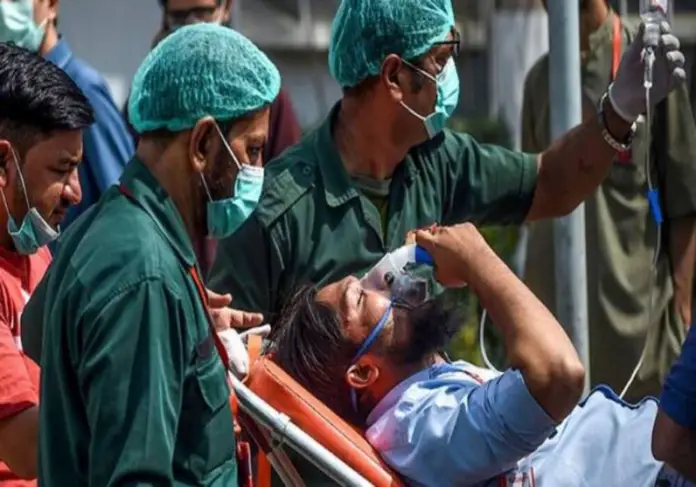Pakistan on Friday reported 7,678 new coronavirus cases during the last 24 hours, the highest since the pandemic began in February 2020.
The country had last seen the highest number of coronavirus cases on June 13, 2020, when 6,825 infections were reported.
The deaths from coronavirus also went up to 23, highest since October 15, in the last 24 hours from five a day earlier, taking the overall death toll to 29,065, official figures showed.
Meanwhile, as many as 59,343 tests were conducted in the last 24 hours, and the positivity ratio shot up to 12.93 per cent. According to the National Command and Operation Centre (NCOC), the number of active cases rose to over 57,000, while 961 patients were in critical care. With the new infections, the overall cases have moved past 1.35 million. Data also showed that Karachi had the highest positivity rate in the country at 45.43pc, followed by 23.94pc in Muzaffarabad and 18.91pc in Islamabad.
The latest surge in cases is being driven by the Omicron variant of the coronavirus, which has triggered a fifth wave of the disease in the country.
Meanwhile, the Ministry of National Health Services urged citizens to get vaccinated and to wear facemasks. “As the Omicron variant surges, we are seeing a drastic increase in the number of Covid-19 cases this month,” it said.
Earlier this week, the NCOC banned indoor gatherings, weddings and dining in districts and cities with Covid-19 positivity rate exceeding 10pc as part of new curbs meant to tackle the fifth wave. Pakistan has also started administering booster doses to the population.
Earlier, people who were 30 years or older and immunocompromised individuals above 12 years of age could receive a booster dose. However, the NCOC later reduced the age limit, allowing citizens over 18 to receive booster jabs. According to a report, Health Services Academy Vice Chancellor Dr Shahzad Ali Khan said the reason behind the rapid rise in the number of cases was the highly transmissible Omicron variant.
“It seems that Omicron has adapted and has become highly infective as it can stay in the environment or air for a longer period. However, there are both positive and negative aspects of the new variant. The negative side is that whatever precautions we take, we will be infected. But those who are vaccinated will have mild symptoms and there is less possibility of them spreading the virus,” he said.
“Those who are not vaccinated may develop severe complications and they could become a factory or producer of the next variant, which can be very virulent,” he warned.
He said that due to its highly transmissive nature, Omicron would definitely tax all available health resources, adding that it would be essential to ensure human resource was available in hospitals and medical facilities to treat the caseload.
He also pointed out that Omicron had severely infected healthcare workers and suggested that they should be made to wear N-95 masks and asked to avoid socialising.
Although the cases are on the rise, top officials have refused to impose a lockdown, saying that the country’s economy could not bear the burden of another. On Wednesday, Prime Minister Imran Khan turned down the possibility of imposing a lockdown.
Addressing a launching ceremony of the National Small and Medium Enterprises (SME) Policy in Islamabad, he said the government will not shut down the economy but will advise people to strictly observe mandated SOPs for Covid-19.
Amid the rapid spread of coronavirus, two major politicians – Leader of the Opposition in the National Assembly Shehbaz Sharif and Federal Minister for Finance and Revenue Shaukat Tarin – also tested positive for coronavirus a few days back.
On the other hand, the NCOC announced on Friday that all schools situated in areas with a high Covid-19 positivity ratio would remain closed for a week. According to a notification issued in this regard, the NCOC said, “Education institutions, premises, sections, specific classes with high positivity to be closed for ONE week.”
The notification further said that provincial administration – in consultation with district health/education authorities and school administrations – were to set a threshold of cases for deciding such closures. The NCOC added that Covid-19 testing in education institutes was carried out in major Omicron-hit cities to ascertain disease spread among students and ensure accurate disease mapping.







